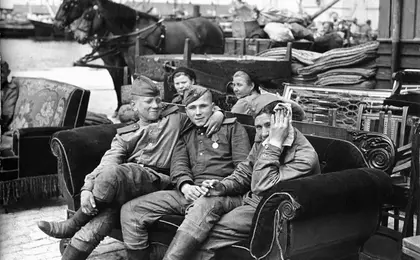In the Baltic Sea, there is an island called Bornholm, the furthest east from the main territory of Denmark, with Sweden close by to the north, and Germany to the south
Denmark country collaborated with the Nazis during World War II and was a German protectorate.
JOIN US ON TELEGRAM
Follow our coverage of the war on the @Kyivpost_official.
On May 4, 1945, the Commander of Wehrmacht units in Denmark, General Georg Lindemann, surrendered to British General Bernard Montgomery.
Consequently, those Germans who were at that time on the island officially capitulated, but did not want to surrender to the Soviet forces. Four days later Soviet aircraft struck Danish cities, and the island of Bornholm also suffered. Ten people were killed, and many houses destroyed.
On May 9, 1945, some 108 Soviet paratroopers on five torpedo boats landed on Bornholm. The German garrison of 1,000 troops and Wehrmacht soldiers, who had ended up there after their retreat, did not resist. German refugees from East Prussia had also fled to the island and were vulnerable.
Subsequently, 9,000 soldiers of the second Belarusian Front arrived on the island.
“They are stealing everything like crooks,” the island’s governor said of the Soviet “liberators” in Copenhagen a week after the occupation.
The Germans on the island had officially surrendered to the British. Therefore, the German commandant of the island refused to meet with Major Pavel Antonik, who led the Soviet troops.
But the Soviet managed to was deceived him. He and his staff were sent to Kolberg (now the Polish city of Kolobrzeg), where the British were supposedly waiting for them.
In response to a request from US General Dwight Eisenhower, the Chief of Staff of the Allied Expeditionary Force, Chief of the Soviet General Staff Aleksey Antonov said the island had been successfully liberated and the German commandant had demanded to surrender to the Soviets.
For ten months, according to the inhabitants, the unexpected “liberators” did whatever they wanted on the island: looted, raped, drank.
This would have continued had not news about this hybrid occupation and information about what was happening on the island reached the British parliament and the UN Security Council. The island’s future became the subject of international concern.
Finally, on April 10, 1946, the last Soviet soldier left the island. Those ten months seemed like eternity for the locals.
Bornholm’s history and geopolitical significance made headlines again very recently. On the eve of Russia’s full-scale invasion of Ukraine on Feb. 24, Moscow claimed the Red Army had been withdrawn from the island on condition that no foreign troops would ever be based there.
Copenhagen was firm in its response. Denmark is a NATO member and will do whatever it sees as necessary to safeguard its security.
Denmark’s Prime Minister Mette Frederiksen reiterated last month that Russia should not interfere in Danish discussions with the United States that could see soldiers placed on the on Bornholm.
You can also highlight the text and press Ctrl + Enter




